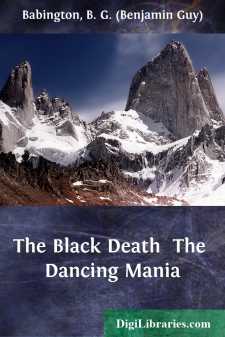Categories
- Antiques & Collectibles 13
- Architecture 36
- Art 48
- Bibles 22
- Biography & Autobiography 813
- Body, Mind & Spirit 142
- Business & Economics 28
- Children's Books 15
- Children's Fiction 12
- Computers 4
- Cooking 94
- Crafts & Hobbies 4
- Drama 346
- Education 46
- Family & Relationships 57
- Fiction 11828
- Games 19
- Gardening 17
- Health & Fitness 34
- History 1377
- House & Home 1
- Humor 147
- Juvenile Fiction 1873
- Juvenile Nonfiction 202
- Language Arts & Disciplines 88
- Law 16
- Literary Collections 686
- Literary Criticism 179
- Mathematics 13
- Medical 41
- Music 40
- Nature 179
- Non-Classifiable 1768
- Performing Arts 7
- Periodicals 1453
- Philosophy 64
- Photography 2
- Poetry 896
- Political Science 203
- Psychology 42
- Reference 154
- Religion 513
- Science 126
- Self-Help 84
- Social Science 81
- Sports & Recreation 34
- Study Aids 3
- Technology & Engineering 59
- Transportation 23
- Travel 463
- True Crime 29
The Black Death The Dancing Mania
Categories:
Description:
Excerpt
INTRODUCTION
Justus Friedrich Karl Hecker was one of three generations of distinguished professors of medicine. His father, August Friedrich Hecker, a most industrious writer, first practised as a physician in Frankenhausen, and in 1790 was appointed Professor of Medicine at the University of Erfurt. In 1805 he was called to the like professorship at the University of Berlin. He died at Berlin in 1811.
Justus Friedrich Karl Hecker was born at Erfurt in January, 1795. He went, of course—being then ten years old—with his father to Berlin in 1805, studied at Berlin in the Gymnasium and University, but interrupted his studies at the age of eighteen to fight as a volunteer in the war for a renunciation of Napoleon and all his works. After Waterloo he went back to his studies, took his doctor’s degree in 1817 with a treatise on the “Antiquities of Hydrocephalus,” and became privat-docent in the Medical Faculty of the Berlin University. His inclination was strong from the first towards the historical side of inquiries into Medicine. This caused him to undertake a “History of Medicine,” of which the first volume appeared in 1822. It obtained rank for him at Berlin as Extraordinary Professor of the History of Medicine. This office was changed into an Ordinary professorship of the same study in 1834, and Hecker held that office until his death in 1850.
The office was created for a man who had a special genius for this form of study. It was delightful to himself, and he made it delightful to others. He is regarded as the founder of historical pathology. He studied disease in relation to the history of man, made his study yield to men outside his own profession an important chapter in the history of civilisation, and even took into account physical phenomena upon the surface of the globe as often affecting the movement and character of epidemics.
The account of “The Black Death” here translated by Dr. Babington was Hecker’s first important work of this kind. It was published in 1832, and was followed in the same year by his account of “The Dancing Mania.” The books here given are the two that first gave Hecker a wide reputation. Many other such treatises followed, among them, in 1865, a treatise on the “Great Epidemics of the Middle Ages.” Besides his “History of Medicine,” which, in its second volume, reached into the fourteenth century, and all his smaller treatises, Hecker wrote a large number of articles in Encyclopædias and Medical Journals. Professor J.F.K. Hecker was, in a more interesting way, as busy as Professor A.F. Hecker, his father, had been. He transmitted the family energies to an only son, Karl von Hecker, born in 1827, who distinguished himself greatly as a Professor of Midwifery, and died in 1882.
Benjamin Guy Babington, the translator of these books of Hecker’s, belonged also to a family in which the study of Medicine has passed from father to son, and both have been writers. B.G....


